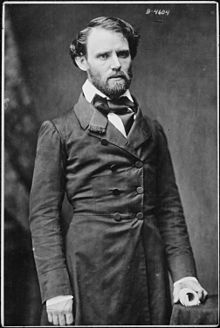George E. Pugh
| George Ellis Pugh | |
|---|---|
 |
|
|
United States Senator from Ohio |
|
|
In office March 4, 1855 – March 4, 1861 |
|
| Preceded by | Salmon P. Chase |
| Succeeded by | Salmon P. Chase |
| 3rd Ohio Attorney General | |
|
In office January 12, 1852 – January 9, 1854 |
|
| Preceded by | Joseph McCormick |
| Succeeded by | George Wythe McCook |
| Member of the Ohio House of Representatives from the Hamilton County district |
|
|
In office December 4, 1848 – December 1, 1850 Serving with Alexander Long and five others |
|
| Preceded by | four others |
| Succeeded by | five others |
| Personal details | |
| Born |
November 28, 1822 Cincinnati, Ohio |
| Died | July 19, 1876 (aged 53) Cincinnati, Ohio |
| Resting place | Spring Grove Cemetery |
| Political party | Democratic |
| Spouse(s) | Theresa Chalfant |
| Children | three |
| Alma mater | Miami University |
| Religion | Roman Catholic |
George Ellis Pugh (November 28, 1822 – July 19, 1876) was a Democratic politician from Ohio. He served in the U.S. Senate.
Born in Cincinnati, Ohio, Pugh attended Miami University. He began practicing law in 1843, later serving as a captain in the 4th Ohio Regiment in the Mexican-American War. After serving in the Ohio House of Representatives from 1848 to 1850, he served as State Attorney General from 1852 to 1854. Pugh served a single term in the United States Senate from 1855 to 1861, losing a re-election bid to Salmon P. Chase, whom he had replaced.
In the Senate, he became a champion of the Western Democracy, that is, Midwestern Democrats, first against the Republicans, and later against Stephen A. Douglas' opponents inside the Democratic Party. He spoke in favor of the Lecompton Constitution on March 16, 1858, but followed the instructions of the Ohio legislature in voting against that constitution.
On February 23, 1859, during the lame-duck session, Albert Gallatin Brown attacked Douglas over popular sovereignty. Douglas defended his position, and was joined by Charles E. Stuart of Michigan, David C. Broderick of California, and Pugh. Pugh said, "In the whole Dred Scott case, there was no act of a Territorial legislature before them [the justices] in any shape or form." Pugh explained, "This is the first time I ever heard, in a case where nine judges pronounce their opinions seriatim, that because one of them {Roger B. Taney} in illustration collaterally makes a reference, that becomes the decision of the court." Pugh answered the demand for a federal slave code, to be imposed on all territories, in this way: "Never; while I live, never! I consider it a monstrous demand."
...
Wikipedia
